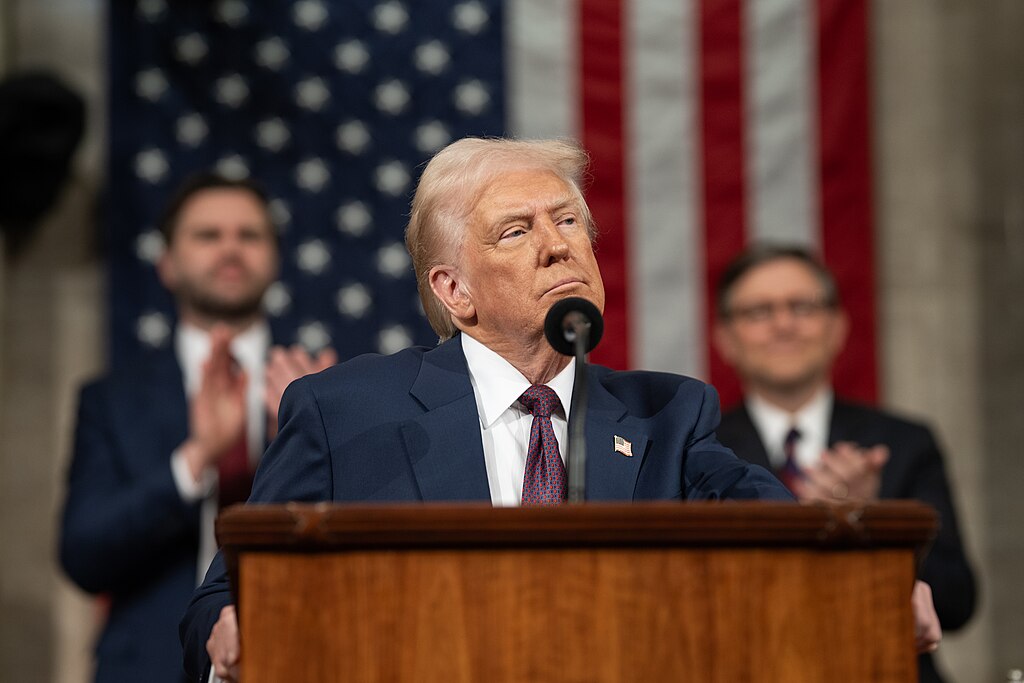U.S. President Donald Trump has issued a stark warning to Iran, threatening military action and secondary tariffs if Tehran refuses to negotiate a new nuclear agreement with Washington. In a recent interview with NBC News, Trump said talks between U.S. and Iranian officials are ongoing but indirect. “If they don’t make a deal, there will be bombing like they’ve never seen before,” he stated.
Trump also mentioned the possible imposition of secondary sanctions on nations purchasing Iranian goods, similar to those he enacted on Venezuela. “We’ll probably give it a couple of weeks… If we don’t see progress, we’re going to put them on,” he told reporters aboard Air Force One.
Iran responded through Oman to a letter from Trump, reiterating its stance against direct negotiations under U.S. pressure. Iranian President Masoud Pezeshkian confirmed that while direct talks are off the table, indirect discussions could continue under guidance from Supreme Leader Ayatollah Ali Khamenei.
During Trump’s first term, he withdrew the U.S. from the 2015 Iran nuclear deal, reinstating tough sanctions. Since then, Iran has expanded its uranium enrichment program beyond the deal’s limits, prompting renewed global concerns. Western powers allege Iran is pursuing nuclear weapons capability, while Tehran insists its program is for civilian energy purposes.
Trump’s recent threats underscore heightened tensions amid stalled diplomatic efforts. His strategy includes economic pressure and the possibility of military force if Tehran does not comply. As nuclear talks remain in limbo, global eyes are once again on U.S.-Iran relations, with implications for regional stability and international oil markets.
This development revives fears of renewed conflict and highlights the geopolitical stakes tied to Iran's nuclear ambitions and U.S. foreign policy in the Middle East.



 Trump Signs Executive Order Threatening 25% Tariffs on Countries Trading With Iran
Trump Signs Executive Order Threatening 25% Tariffs on Countries Trading With Iran  U.S. Announces Additional $6 Million in Humanitarian Aid to Cuba Amid Oil Sanctions and Fuel Shortages
U.S. Announces Additional $6 Million in Humanitarian Aid to Cuba Amid Oil Sanctions and Fuel Shortages  US Pushes Ukraine-Russia Peace Talks Before Summer Amid Escalating Attacks
US Pushes Ukraine-Russia Peace Talks Before Summer Amid Escalating Attacks  Pentagon Ends Military Education Programs With Harvard University
Pentagon Ends Military Education Programs With Harvard University  Jack Lang Resigns as Head of Arab World Institute Amid Epstein Controversy
Jack Lang Resigns as Head of Arab World Institute Amid Epstein Controversy  China Warns US Arms Sales to Taiwan Could Disrupt Trump’s Planned Visit
China Warns US Arms Sales to Taiwan Could Disrupt Trump’s Planned Visit  Federal Judge Restores Funding for Gateway Rail Tunnel Project
Federal Judge Restores Funding for Gateway Rail Tunnel Project  Trump Says “Very Good Talks” Underway on Russia-Ukraine War as Peace Efforts Continue
Trump Says “Very Good Talks” Underway on Russia-Ukraine War as Peace Efforts Continue  U.S.-India Trade Framework Signals Major Shift in Tariffs, Energy, and Supply Chains
U.S.-India Trade Framework Signals Major Shift in Tariffs, Energy, and Supply Chains  India–U.S. Interim Trade Pact Cuts Auto Tariffs but Leaves Tesla Out
India–U.S. Interim Trade Pact Cuts Auto Tariffs but Leaves Tesla Out  Missouri Judge Dismisses Lawsuit Challenging Starbucks’ Diversity and Inclusion Policies
Missouri Judge Dismisses Lawsuit Challenging Starbucks’ Diversity and Inclusion Policies  Trump Endorses Japan’s Sanae Takaichi Ahead of Crucial Election Amid Market and China Tensions
Trump Endorses Japan’s Sanae Takaichi Ahead of Crucial Election Amid Market and China Tensions  Trump Lifts 25% Tariff on Indian Goods in Strategic U.S.–India Trade and Energy Deal
Trump Lifts 25% Tariff on Indian Goods in Strategic U.S.–India Trade and Energy Deal  South Korea Assures U.S. on Trade Deal Commitments Amid Tariff Concerns
South Korea Assures U.S. on Trade Deal Commitments Amid Tariff Concerns  Trump’s Inflation Claims Clash With Voters’ Cost-of-Living Reality
Trump’s Inflation Claims Clash With Voters’ Cost-of-Living Reality  Nighttime Shelling Causes Serious Damage in Russia’s Belgorod Region Near Ukraine Border
Nighttime Shelling Causes Serious Damage in Russia’s Belgorod Region Near Ukraine Border 































